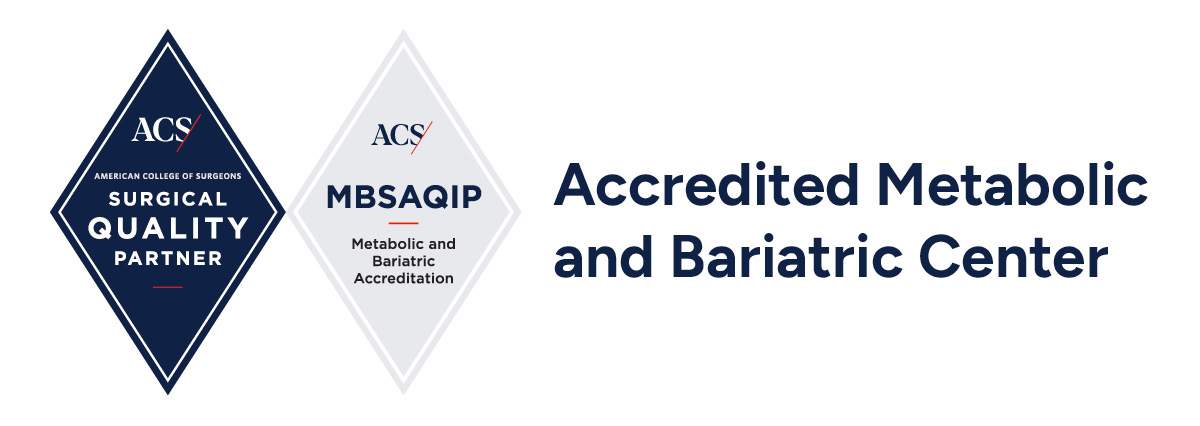Obesity — A Matter of Life and Death
More than 12.5 million Americans are severely overweight, according to the U.S. Department of Health and Human Services. Obesity, which refers to excessive body fat, can cause many health problems and put you at a higher risk for diseases such as high blood pressure, diabetes, heart disease, stroke, sleep apnea, respiratory problems and some forms of cancer.
Many people who are seriously overweight have tried different diets, medications and professional weight-loss services for years without long-term success. Weight-loss, or bariatric, surgery at Texoma Medical Center (TMC) in Denison, TX can help patients struggling with obesity to get the long-term care they need – and be able to live a long and active life.
 Are you a candidate for weight-loss surgery?
Are you a candidate for weight-loss surgery?
Complete this assessment to help determine if minimally invasive weight-loss surgery is right for you.
Weight-loss surgery may be right for you if:
- You're over age 18.
- You're at least 50 pounds overweight, depending on other serious health conditions like hypertension.
-
Body Mass Index (BMI) calculations are at 35 with one obesity-related health problem (type 2 diabetes, heart disease or sleep apnea). You're may also be eligible if your BMI is greater than 40, with or without related health problems.
Calculate your BMI →
Have you tried other weight-loss methods without success? Ask yourself : - Are you medically stable and physically able to withstand surgery?
- Did you pass the psychological screenings that help determine if you're able to follow through with postsurgical behavior modifications (like exercise)?
- Have you completed all required pre-operative medical and health testing?
Awards and Recognitions
Blue Distinction® Center+
We are recognized as a Blue Distinction® Center+ for quality and cost-efficiency in Bariatric Surgery by Blue Cross and Blue Shield of Texas.

Bariatric Center of Excellence
The Weight-Loss Surgery program at TMC was named a Bariatric Center of Excellence for Optum (UnitedHealthcare) for meeting the clinical qualifications and maintaining a cost-effective contract for participation in the network.

Fully Accredited Metabolic and Bariatric Center of Excellence
The weight-loss surgery program at Texoma Medical Center in Grayson County, TX, has been designated a fully accredited Metabolic and Bariatric Center of Excellence by the Metabolic and Bariatric Surgery Accreditation and Quality Improvement Program (MBSAQIP) and a Surgical Quality Partner by the American College of Surgeons. This national recognition speaks to the high level of care the staff provides to TMC's bariatric patients, as well as the hospital's dedication to patient safety and results.

Weight-Loss Surgery Options
Weight-loss surgery at TMC helps people lose weight by reducing the size of the stomach through the removal of a portion of the stomach (gastric sleeve). After surgery, patients eat less food to feel full and satisfied. The amount of weight you lose will depend on the type of surgery you have and how committed you are to making lifestyle changes. With the weight loss, most related conditions improve, like lowering your cholesterol.
Many patients will find they no longer need medication for diabetes, high blood pressure or high cholesterol, and conditions such as sleep apnea may improve.
Laparoscopic gastric bypass
During laparoscopic gastric bypass surgery, a surgeon creates a small pouch from the top section of your stomach, then attaches it to your small intestine. In effect, it helps restrict the amount of food you eat so you’ll absorb fewer calories, enabling you to lose weight. By bypassing the majority of the stomach, it will hold less food and limits the amount of nutrients the body absorbs. Consequently, patients are full faster, eat less, take in fewer calories and can lose weight.
Most patients experience a 70-80 percent reduction of excess body weight over one to two years after the procedure. Medical conditions such as diabetes, hypertension, hyperlipidemia and sleep apnea can also improve dramatically, if not cured completely.
Laparoscopic sleeve gastrectomy
Also known as vertical sleeve gastrectomy, is the latest weight loss procedure at Texoma Medical Center. It also restricts the amount of food consumed by the patient by removing up to 85 percent of the stomach. In addition, the removal of the stomach decreases hunger hormone levels so patients feel less hungry while they lose weight.
Patients undergoing the sleeve can typically expect an overnight stay in the hospital and can usually return to work in about a week. Sleeve patients typically can expect on average, a loss of 60-70 percent of their excess weight within two years of having surgery.
Da Vinci Xi® Surgical System
Robotic-assisted surgery at Texoma Medical Center in Texas is our latest tool to assist patients in their weight-loss journey. Our skilled bariatric surgeons are trained on the da Vinci Xi Surgical System, and the advanced robotic platform enables doctors to perform complex procedures using smaller incisions (than standard surgery) with tiny, precision tools operated robotically.
Learn about the benefits of robotic surgery →
Adjusting to Lifestyle Changes
Regardless of which weight loss surgery you have at TMC, care teams prepare patients for major changes in their lifestyle and eating habits to be successful. For example, patients recommendations may include:
- Restrict the amount and types of food they eat
- Avoid drinking liquids with meals
- Avoid alcohol and hard-to-digest fats
- Stick with a consistent, moderate exercise program
- Take daily vitamin and mineral supplements
- Return for annual follow-up exams with their surgeon
Get started on a unique weight-loss journey
For more information about bariatric surgery at TMC, here are commonly asked questions. You can also speak to the surgery coordinator at 903-416-4477.
Find a doctor
If you need a referral to a weight-loss surgeon or other physician at Texoma Medical Center, call our free physician referral service at 903-416-3627.
Individual results may vary. There are risks associated with any surgical procedure. Talk with your doctor about these risks to find out if bariatric surgery is right for you.
